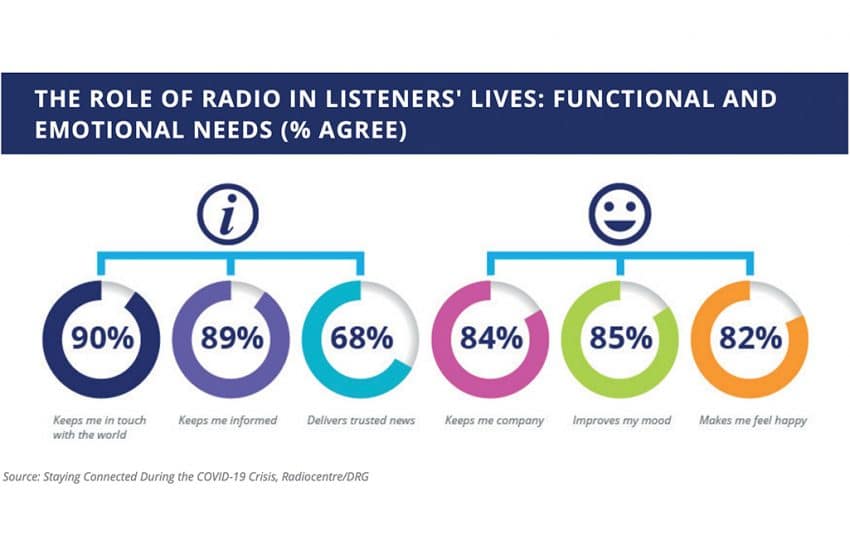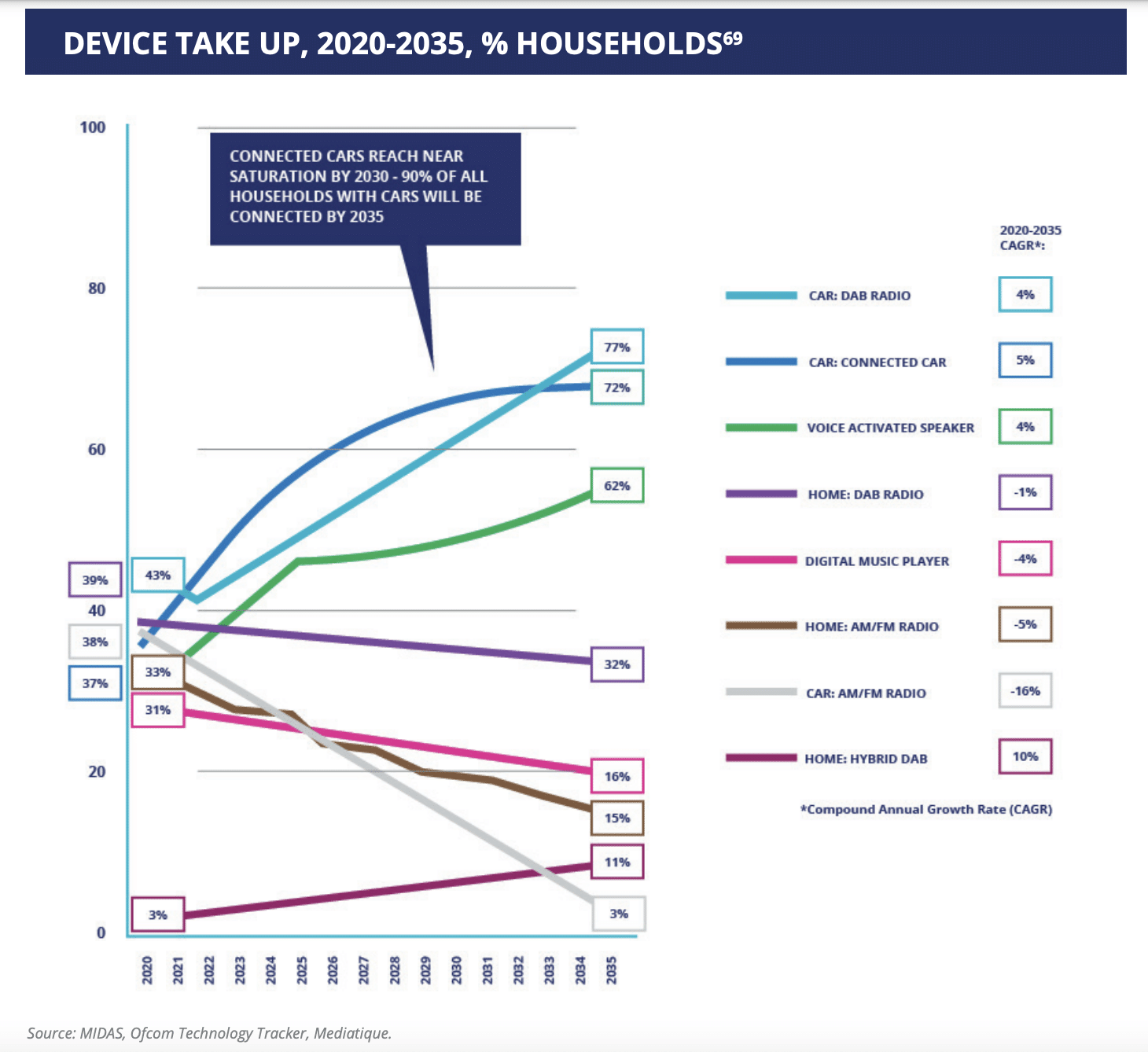
LONDON — Snapshots can be very informative, telling us how things were at a particular moment.
In some 50 years’ time, any researcher who finds the Radio and Audio Review, commissioned by the United Kingdom government and published in late October, will be grateful to have such a comprehensive overview of the radio industry, its unique contribution to society and the challenges it faces.
The issues are not just of relevance in the United Kingdom, since the report — together with the associated research — holds up a mirror to radio across Europe. Progress might be happening at different speeds, but the broad direction of travel is similar.
So, for that reason, I felt it was worth sharing some initial reflections on the report. And while the orientation is understandably British, I have the feeling that this work may shape strategic thinking even beyond the U.K. Indeed, it identifies areas where European collaboration is vital for the future of radio, particularly in dealing with device and automobile manufacturers.
Local Radio’s Strength
While the last months have been nothing short of tragic, COVID has been positive for the radio sector. It has reminded everyone, including those excited by new audio options, just how important nationally and locally based radio was in targeting informational and psychological needs during lockdown.
In providing temporary local stations, promoting well-being, and making virtual church services available, radio’s value in overcoming loneliness has been inestimable. It was interesting to see research showing that listeners valued radio for a blend of emotional and informational reasons.
A high proportion of listeners saw it as a tool to stay in touch, while its capacity to keep people company and improve mood cannot be overestimated. As such, in difficult times, people can consciously appreciate the benefits it can provide.
In providing temporary local stations, promoting well-being, and making virtual church services available, radio’s value in overcoming loneliness has been inestimable.
Such targeted research, and the detail which supports it, may well prove useful in supporting advocacy internationally. The report also references the special value of radio to audiences that otherwise would be more marginalized — the older, disabled and vulnerable.
It was no surprise to learn that radio finds itself pitted against streaming alternatives in the competitive youth market. However, it was concerning to learn that radio was underperforming as a medium with black, Asian and minority ethnic audiences.
Clearly, that is something that needs addressing in the U.K. and perhaps elsewhere. Continued support for community radio can help, and here small-scale DAB has already played a part, harnessing the low-cost technology for specific interest groups. There are over 300 community radio stations already, 40 of which serve ethnic minorities.
Distribution
Inevitably, issues around prominence and distribution constitute a large proportion of the report.
Here the content aligns with the recent appeal to Brussels from the European Broadcasting Union and the Association of European Radios, together with the European Digital Radio Alliance, to limit the power of tech giants with regard to voice devices, where they could privilege their own content, withhold data or editorialize around services.

This is made even more urgent because of the rapid adoption in smart speakers; 42% of U.K. adults now regularly use one. The issue here is that sales of DAB radios fell by 17.8% in 2020.
Why own a device that only gives you radio when a single box can give you a variety of options — including heating, alarm systems and lighting? In the domestic environment, this makes sense, and while DAB seems to be advancing in cars, it is set to flatline at home.
In the U.K., DAB is almost universal in new cars, and available in around 50% of cars currently on the road. That makes for a clear divergence between home and car, especially as voice control becomes more common in vehicles.
This will mean that implementing an attractive solution for in-car listening, complementing the DAB signal, will become an urgent priority if radio is not to be upstaged by the new entrants. The report raises many issues around voice devices, not least the issue that you cannot browse — you need ask for something specific.
In these circumstances, the old experience of moving the dial and being surprised by unexpected content, well-replicated on screen-based devices, simply ceases. What does this mean for those launching new channels, and for existing channels, when BBC research shows that “credit” to the broadcaster falls dramatically when content is consumed on third-party platforms?
The arts of scheduling, understanding the contours of people’s lives and daily habits, as well as providing a balanced diet of content, cannot be forgotten too quickly.
As for FM, it seems to be secure until 2030, meaning double transmission for at least the next decade. Clearly, there are environmental benefits to be gained from switching off and relying on the cleaner option of DAB, but this is weighed against the possibility of exclusion in remote areas.
One cause for reflection is the projection that even by the mid-2030s, live radio will account for 50% of the listening experience. That’s a warning to those, myself included, who have organized conferences and seminars around the exciting new possibilities. It means that the arts of scheduling, understanding the contours of people’s lives and daily habits, as well as providing a balanced diet of content, cannot be forgotten too quickly.
This useful snapshot shows radio in transition. There is a lot of detail here, which cannot be contained in my quick summary and response. It is also worth noting that the main report can take you on interesting journeys though other research, which I look forward to exploring in the coming weeks.
Yes, radio is in transition regarding distribution and may well require some protection to ensure prominence within the changing device landscape. Here the vital role played by the radio sector in meeting the COVID challenge, vividly demonstrated through services sensitive to local conditions, strengthens radio’s hand when dealing with government and regulators.
Graham Dixon was head of Radio at the EBU until 2020, and before that managing editor of one of the BBC’s national stations. He currently advises media organizations, such as Radioplayer and the European Digital Radio Alliance.





















